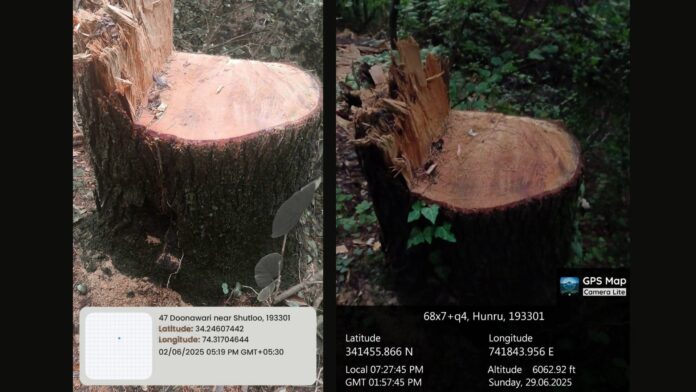Srinagar July 10: The large-scale illegal felling of forest trees in the JV forest division continues unchecked. Locals allege that forest officials are in collusion with timber smugglers, allowing the plunder of green cover. Residents warn that this not only threatens the environment but could also lead to severe ecological consequences if immediate action is not taken.
Despite tall claims by the government of controlling timber smuggling, the failure to put in place a proper mechanism to protect forests is facilitating unbridled felling of trees in North Kashmir’s Baramulla District.
Sources told that timber smugglers were systematically felling the prized Deodar and Kail trees in Janbazpora Compartment number 4A & 4B Moond.
“They burn the stems of trees and ferry the timber logs on horses. The logs are then cut into different sizes in illegal saw mills owned mostly by timber smugglers,” sources said and added the forest officials have failed to take any action against the smugglers.
Locals of Baramulla complained a great game is underway between government officials and timber smugglers. “In the day, the slopes are guarded by Forest Department personnel, but in the night, it’s the smugglers whose writ runs large,” they said.
“We have many times informed the authorities about vandalization of forests. But our requests were not heeded. The smugglers have spread a reign of terror and in fact run their own administration. If this goes on, after few years Baramulla would turn into a desert,” they lamented.
Timber smuggling is lucrative because there is a big gap between supply and demand in the state. According to one estimate, the annual demand for wood in Jammu & Kashmir is around one crore cubic feet. The market rate of Deodar ranges from Rs 3000 to Rs 4000 per cubic feet while Kail and Budul are sold for Rs 1700 to Rs 2500 and Rs 800 to Rs 1200 per cubic feet respectively.
Experts have warned that the unabated felling of trees can trigger a major ecological disaster in the Valley. The wanton loot of forests has started to show its effects in the north Kashmir, which is facing acute shortage of water for irrigation and drinking purposes. Due to extensive felling of trees in upper reaches of Rafiabad area of Baramulla district, particularly in the last 22 years, soil has started to erode and settle in the Jhelum, which is the main water resource.








